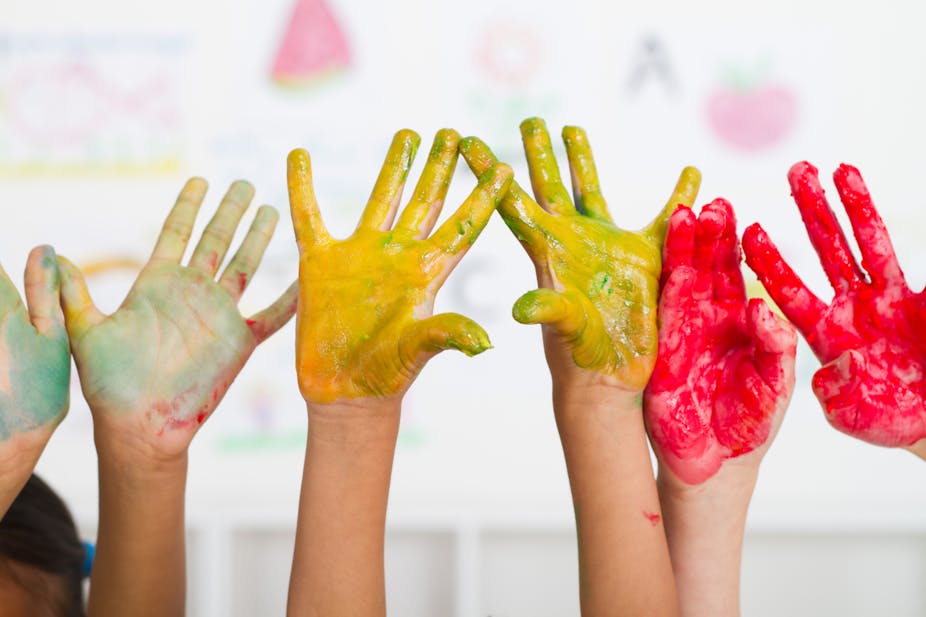We know that when it comes to brain development, it continues throughout most of our lives – from infancy to adulthood. But unlike other more obvious signs of growing up, many parents underestimate how much a child’s brain changes from year to year.
Research shows that during early childhood, the links within the brain are busy forming – this is a time when children are learning to learn. And their brains are gradually forming connections that enable them to organise their thoughts.
For children to be able to learn new information, they need to relate the new learning to previous learning. They need to develop an awareness of their own thinking and to monitor their thoughts, emotions and actions. And these capacities develop best through play.
Psychologist Pam Jarvis explains this in her blog The Psychological Historian, using an analogy of trying to put clothes into a wardrobe with insufficient hangers. The hangers are the neural connections in the brain. Without enough hangers, some of the clothes will fall to the floor in a jumbled mess. In the same way, if new information is given to children who have not yet developed enough neural connections, the knowledge will not be retained.
In this way then, teaching is most successful when the child can use their individual interests as a “hanger” to put the new knowledge onto. This happens in play, as the child chooses what they would like to play with and the adult can support them by challenging them to think at the next level.
Less time to play
It’s not surprising then that a recent report from Ofsted (the Office for Standards in Education) which calls for less play and more formal lessons has caused shockwaves among early years teachers.
The Bold Beginnings report outlines aspects of good practice with four to five-year-olds in a number of primary schools. It claims that for many children, the reception year is a false start as by the end of it, children are not adequately prepared for school.

To combat this, Ofsted suggest teachers spend less time supporting children’s learning through play, and more time teaching formal lessons.
The report was met with outcry. A letter signed by over 2,800 teachers, academics and educators – including the professor and TV presenter Robert Winston – was sent to The Guardian, asking for the report to be withdrawn.
Play power
Part of the problem, is there is little evidence the writers of the Bold Beginnings report have considered the brain development of children.
In the report, four and five-year-olds are presented as being the same as older children. A headteacher in the report is even quoted as saying: “We have the same learning and behavioural expectations from the start of school as we do at the end.” This may appear to be quite reasonable, but research into learning through play indicates that learning expectations should actually be very different.
Recent research from the world of neuroscience demonstrates that learning through play develops the executive function of the child’s brain. Cambridge professor, Usha Goswami, in her book Cognitive Development, describes this as a function of the brain that helps us to regulate our thoughts, emotions and behaviour.
Fun and games
It includes skills such as problem solving, planning, thinking outside the box and controlling behaviour. Young children develop these skills through play, which enables them to become successful learners in the future. In this way, research shows play is more effective than formal teaching in preparing children for difficult high level thinking and problem solving tasks.

Play also enables children to make sense of the world. This is because rather than knowledge being transferred to the child from the teacher, children in play, actively make their own meaning. Children find out for themselves how the world works, how numbers work, how writing works, how to communicate and relate to others through their playing.
Academics from Cambridge University found that in play, children work together to make meaning. They support and “scaffold” each other as they work together on shared play projects, in role play games and many other social endeavours.
Future learners
The belief in play-based learning is central to the ideology of most working in early years education. The reason for this is that it is the best way for young children to learn. In fact, without play, early years would be exactly the same as school.
Play in Ofsted’s report is not presented as being essential to children’s development. While acknowledging that it is an important way to teach certain subjects – such as personal, social and emotional development they suggest that it is not the best method to teach maths and English.
Ofsted recommend teachers should devote “sufficient time each day to the direct teaching of reading, writing and mathematics”. By “direct teaching”, Ofsted mean more formal teaching methods, which involve the teacher delivering a traditional lesson to the class. But while direct teaching can have a place in early years education, the balance needs to be right – for the sake of the children.

